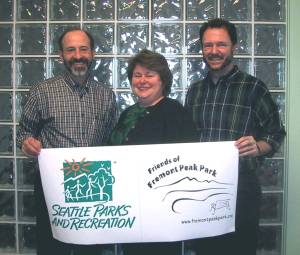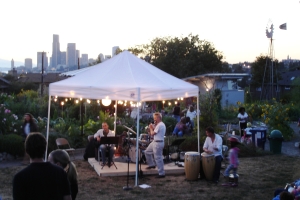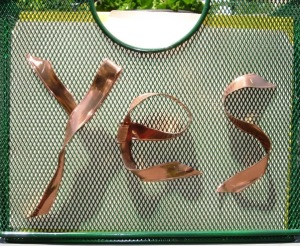Vision and Scope
Starting Your Project
The first challenge is to scope your project and gather support.
What do want to do?
Describe your vision
What do you hope to accomplish? Talk first with those who can understand your vision. Build it up and flesh it out as much as possible, before you worry about obstacles. Use a white board or pad of paper. Write down as many ideas as possible and review them periodically. Photographing your notes is a slick way to remember brainstorming sessions. Digital cameras make this an instant way to record minutes and distribute them by email.
Visualizing
Modeling of any sort can help you visualize. Make sketches or 3D models, play in the sandbox, take photographs and write stories. Do anything to build images that will lead you to your dream. Use these images to get others on board. Use the images to raise funds.
Do you need a life-size model? You can use rope or contractor’s ribbon to mark out a space in a park or on a parking lot, then walk around getting the full size perspective that you need.
Check out our Projects Photo Gallery for more inspiration.
Define Your Scope
How big is your project and what do you need to accomplish it?
Do you need money? We can getting you started on finding Funding.
Do you need contacts?
Do you need neighborhood support, Community Council support, City Parks support, Departments of Transportation Support, county support, state support? Do you need land? Do you need architects, engineers, cooks, writers or artists?
Do you need an artist, materials, contractors, dirt or plants?
Networking is a great way to find the things you need. We can get you started with our collection of links to all kinds of resources as well as making strategic introductions.
Do you need support?
Does anyone but you care about your dream? Probably the most important support is the moral support of those who will cheer you on and help you. Build those relationships. By creating a dream, you are giving others something to get excited about. You’ll be surprised how much they’ll appreciate that and how important that will be to you.
Others – even good friends – may not think your idea is so good. Don’t be discouraged. No matter how good your idea is there will be detractors, for many strange and human reasons. Persevere!
If you’re going to lead a project that will last for more than a year, we’d recommend you study leadership. It’s probably not what you think it is. See our Inspiration page and look at our leadership links.
Gather Your Team
Whatever you need, begin networking for it. Ask others who have been successful at what you want to do. Most people will be thrilled to pass on their knowledge. That’s why we created Urban Sparks; it’s a thrill to help you create something good.
What Support Looks Like
Does anyone but you care about your dream? Probably the most important support is the moral support of those who will cheer you on and help you. Build those relationships. By creating a dream, you are giving others something to get excited about. You’ll be surprised how much they’ll appreciate that and how important that will be to you.
Others – even good friends – may not think your idea is not so good. Don’t be discouraged. No matter how good your idea is there will be detractors, for many strange and human reasons. Persevere!
If you’re going to lead a project that will last for more than a year, we’d recommend that you study leadership. It’s probably not what you think it is. Also try diving in to our Leadership Profiles to get inspired.
Getting Started with Contacts
 Do you need contacts? Do you need neighborhood support, Community Council support, City Parks support, Departments of Transportation Support, county support, state support? Do you need land? Do you need architects, engineers, cooks, writers or artists? Whatever you need, begin networking for it. Ask others who have been successful at what you want to do. Most people will be thrilled to pass on their knowledge. That’s why we created Urban Sparks; it’s a thrill to help you create something good.
Do you need contacts? Do you need neighborhood support, Community Council support, City Parks support, Departments of Transportation Support, county support, state support? Do you need land? Do you need architects, engineers, cooks, writers or artists? Whatever you need, begin networking for it. Ask others who have been successful at what you want to do. Most people will be thrilled to pass on their knowledge. That’s why we created Urban Sparks; it’s a thrill to help you create something good.
Do you need an artist, materials, contractors, dirt or plants? Networking is a great way to find the things you need. Here is a start – our collection of links to all kinds of resources. Resources and Links
Getting Started with Funding
Funding needs can be very small to very big.
For very small projects, the simplest approach might be to reach into your own pockets or those of a few friends. The time it takes to raise money elsewhere is significant. Pay attention to your time to help assess whether various fundraising activities are worth the trouble.
When more cash is needed, consider using a 501(c)(3) fiscal sponsor like us to receive tax-deductible donations and foundation grants to fund your project. This method is particularly useful when you have donors identified but your organization is not a 501(c)(3).
Seattle’s Department of Neighborhoods Neighborhood Matching Fund is the gateway to City-of-Seattle-funded volunteer projects, offering several levels of funding for community projects. Many Seattle neighborhood projects start their funding here. This matching fund, with its matching and reporting requirements, is respected around the world for the way it engages community and leads to finished projects. It is also respected by other funding agencies, so it is a good place to start when you are trying to put together an array of funding sources.
There are many sources of money
Individuals, businesses, foundations, labor unions, churches, guilds, government budgets, all can provide funding. It all depends on what you are trying to do. Look at our list of useful links and resources, call us, get funding lists from other projects and come back here to see what we’ve added.
Don’t over look pro bono or in-kind donations!
This is work that someone or some business is willing to do for free or goods that someone is willing to donate. A printer might print your poster for free; a local contractor may donate some backhoe time; a nursery may donate plants. Think about who might like to support a project like yours and ask. Fundraising seminars always make one thing clear: All those who give, were asked.
Get in touch and we’ll discuss your project.
Links & Resources
Links and Resources
Here are links to local organizations that can help you with your project…
City of Seattle
- City of Seattle website
- Seattle Department of Neighborhoods
- Volunteering in Parks
- Seattle Parks and Recreation
- Board of Park Commissioners
- Seattle City Council
- Mayor Nickels
- S-DOT Seattle Department of Transportation
- Seattle City Light
- Seattle Police Department
- Aerial maps and photos
Neighborhood Organizations
- Fremont Aurora Wallingford Neighborhood
- Fremont Neighborhood Council
- Fremont Arts Council
- Fremont Public Association
- History House
- Fremont Chamber of Commerce
- Phinney Neighborhood Association
Kids Organizations
Seattle Schools, Public
- Seattle Public Schools
- B.F. Day School (Fremont)
- West Woodlawn Elementary (Ballard)
- Ballard High School
- Whitman Middle School
- Alternative and Private Schools
Seattle Schools, Private
Foundations
Bicycling
Skateboarding
- Skatepark & Culture in the Pacific NW
- Puget Sound Skateparks Association
- River City Skatepark
- Seattle Parks and Recreation: Skateboard Park Advisory Committee
Flora, Fauna, and Environmental
- Plant Amnesty
- Tree Doctor and Tree Climbing
- Washington Native Plant Society, Central Puget Sound
- Seattle Audubon
- Northwest Environmental Watch
- Northwest Environmental Project
- Coalition on the Environment and Jewish Life
- Tides Center (supporting people working for social change)
- Tides Foundation
Land Conservation
Miscellaneous
Marking Milestones
 Groundbreakings, Dedications, and Other Excuses for a Party
Groundbreakings, Dedications, and Other Excuses for a Party
Projects for the common good come with a lot of rewards. The recognition that YOU made a positive change in your neighborhood feels great. We know that there are moments during the community project process that are a bit more….challenging. Exhausting, even. That’s why we encourage all our project leaders to take time to celebrate. Celebrate beginnings, middles, and ends with groundbreakings, ribbon-cuttings, dedications, and any other ceremony that will be meaningful for you and your neighbors.
You envisioned a better world and worked to make it reality. Let’s toast to that!
Leadership Profiles
Whatever your skills or passion, it feels good to give to your community. Our profiles of volunteers show how others have contributed to or led community projects.
Jennifer Smith
“I think that everyone is moving so fast and that our cities are growing. Often times you are living so close to your neighbors and it is nice to have a green space to appreciate quiet, to meet your neighbors, for kids to play or to view a beautiful sunset. I think that preserving green space in any city is important. In Minnesota where I am from, we have more space and so here I feel dedicated to keeping some of the city green. If we can preserve land, it would benefit Seattle a lot.”
Read more 
Jennifer Wengeler
“I want to contribute in some way. It is like me to want to do something with a lot of freedom about when I do it. I don’t have to schedule it with other people; I can do it if and when I want to and I like that what I’m doing is outdoors. I think every action makes a difference. Every ounce of peace in someone’s heart contributes to world peace.”
Susan Casey
“Barbara Donette says that in community gardens we grow food and we grow community. You can connect with people over gardening in a way that you can’t otherwise. I know the people down at the garden more than I do the neighbors in my apartment building. It means that we connect over a larger geographic area, we are growing things concurrently and connecting on a basic level. We all need the garden to connect with community and to grow healthy, local, fresh food.”
Judith and Peter Elkins
“Both our families and friends have set great examples for us in the area of community participation, stewardship, and accountability resulting in solid roots to evolve from.”
David Berger
“I am inspired by a moral aesthetic toward improving things in the world and my family has a tradition to do volunteer work. My grandmother was always a big volunteer in her community. She always said, Service is the price you pay for the air you breathe.“
Read more 
Karen Moe
I like being an active member of my community, instead of just passively enjoying it. And volunteering is a great way to meet my neighbors. It tickles my sense of fun and creativity to be able to create interesting spaces with things for people to look at and interact with – doing something as easy as planting a few colorful flowers by a public staircase brings so much enjoyment to others and contributes to the character of my community.”
Read more 
Jack Tomkinson
 “Generosity seems to be a basic human trait, one that holds the world together generation after generation, despite all of the awful things in the news. I’m grateful for, and I admire the people who try to make our world a place to enjoy and to be proud of. So when I volunteer I feel I am honoring the goodness in people.”
“Generosity seems to be a basic human trait, one that holds the world together generation after generation, despite all of the awful things in the news. I’m grateful for, and I admire the people who try to make our world a place to enjoy and to be proud of. So when I volunteer I feel I am honoring the goodness in people.”













